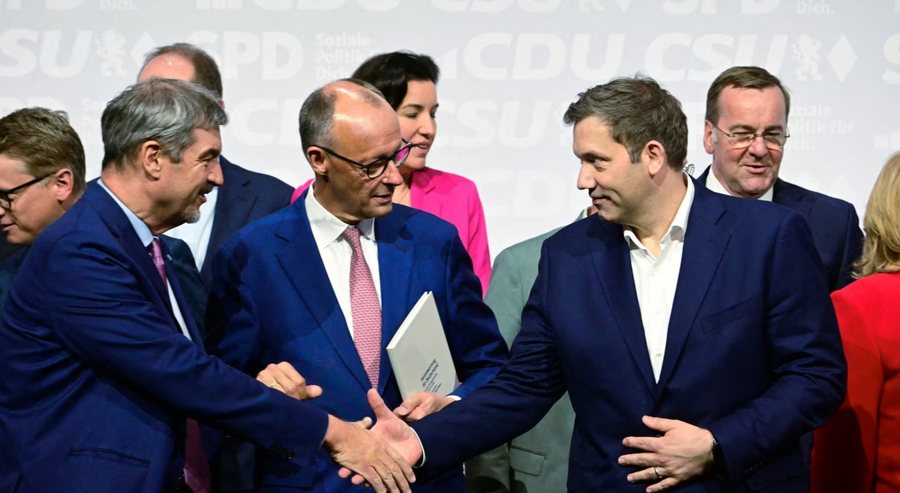
Germany's new governing coalition, led by conservatives, begins work on Tuesday under the leadership of new Chancellor Friedrich Merz, about three months after February's parliamentary elections.
The coalition – made up of the Christian Democrats of Merz (CDU), the Christian Social Union of Bavaria (CSU) and the center-left Social Democratic Party (SPD) – is set to govern Germany for the next four years.
These three parties drew up a governing program in the coalition agreement in April, promising to revive the weakened economy, tighten immigration rules and cut state spending.
Critics have argued that the 144-page document lacks concrete commitments, and that even those promises that are included are limited by what has been called a "financial conditionality," A2 reports.
However, Merz is expected to have more budgetary flexibility than his predecessor Olaf Scholz, after the parties swiftly passed a historic package in parliament, changing constitutional rules to allow increased defense spending and approving a 500 billion euro fund for infrastructure and climate protection measures.
So, what achievements have the coalition partners pledged to achieve?
Strengthening the economy
The new government's main task will be to restart Germany's economic engine, as the country's economy has stalled for two consecutive years following Russia's invasion of Ukraine.
To encourage investment, the coalition will allow companies to exempt 30 percent of their investments from tax for the next three years, while corporate income tax will be gradually reduced from 2028.
The partners also want to reduce bureaucracy, by abolishing the German Supply Chain Act that came into force in 2023 and oversees human rights and environmental risks along a product's supply chain.
Instead, German companies will be subject to the EU Supply Chain Directive, avoiding additional documentation.
The coalition also aims to combat high energy costs and set a price ceiling for industries that consume a lot of electricity.
Curbing immigration
The most controversial topic during the election campaign in Germany was curbing immigration, after several attacks were blamed on refugees.
The coalition has pledged to maintain border control and to turn back illegal immigrants, even if they seek asylum. But the decision will be made "in coordination with our European neighbors."
No new voluntary refugee resettlement program will be approved, while refugees with limited protection status will not be allowed to bring family members to Germany for an initial period of two years.
The new government also plans to change the rules on citizenship, removing the path to obtaining citizenship after just three years of residence for well-integrated immigrants in particular.
However, the reduction of the standard residency requirement for citizenship from eight to five years will be maintained, as will the possibility of dual citizenship for residents from non-EU countries.
Defense, security and foreign policy
The Merz administration will face a world undergoing change, as Europe is shaken by the return of Donald Trump to the White House.
The coalition agreement reaffirms the parties' commitment to the European Union, NATO, and the transatlantic economic partnership with the US, despite Trump's aggressive trade policies.
Regarding defense, the new administration aims to create a voluntary military service program based on the Swedish model, almost 15 years after the country suspended conscription.
Also, a National Security Council will be created, which will collect data and enable faster decision-making on national and international crises.
Budget and social spending
The coalition wants to save on government spending by making big cuts to the federal budget.
In the civil administration, 8 percent of jobs will be cut over four years – with an exception for the security forces.
The number of federal commissioners – independent experts who advise the government – will be halved, while a total of 1 billion euros will be saved in development programs and contributions to international organizations.
The previous unemployment benefit reform, known as "citizen income", will be renamed "basic security for job seekers" and tightened.
In extreme cases, “complete withdrawal of benefits” will be possible if a person consistently refuses reasonable job offers.
The coalition could also reform the 8-hour workday regulation, replacing it with a weekly framework for working hours.
In a victory for the Social Democrats, the agreement includes a commitment to a minimum wage of 15 euros per hour.
Taxes and subsidies
The parties had major differences over taxes during the campaign – the conservative CDU/CSU bloc promised tax cuts, while the SPD sought to raise them for those on high incomes.
The agreement is a compromise: it aims to reduce taxes within two years for those with middle and low incomes.
The controversial 5.5 percent "solidarity" surcharge, used to finance the costs of German unification, will remain in place for high-income citizens and companies, while subsidies for commuters will be expanded.
Speaking of transport, the "Deutschlandticket" ticket - which offers unlimited access to regional public transport for a monthly price of 58 euros - will remain valid after 2025, but users should prepare for price increases from 2029.
Other promises include: a legal right to maternity leave for self-employed women, and an expansion of the “mother’s pension,” which compensates parents for years spent raising children. The standard pension level will be set at 48 percent of average earnings by 2031.
Cash payments, cannabis and coronavirus
The document also contains further commitments in various areas, from cash payments to cannabis policy.
Many visitors to Germany are surprised by the widespread use of cash in small shops.
Under the agreement, the coalition aims to offer at least one digital payment option to consumers.
Meanwhile, the previous government's partial legalization of cannabis for adults will be reviewed, and an official commission will be established to investigate the strict measures taken during the coronavirus pandemic./ REL (A2 Televizion)











